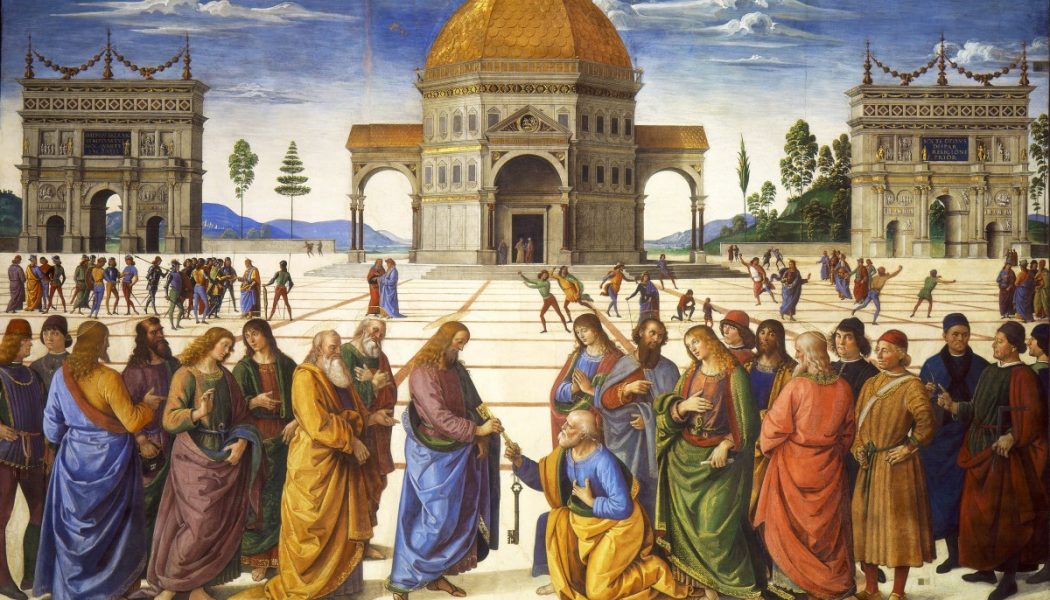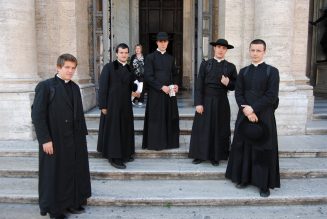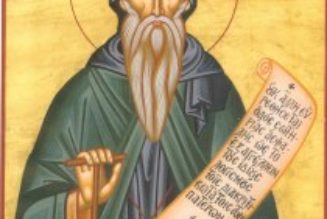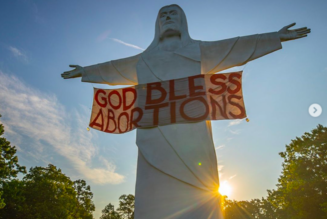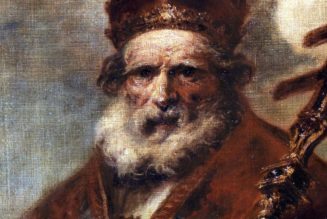
In terms of Catholic “preachability,” this Sunday’s Readings are a soft-ball pitch, a long high arc that every homilist ought to be able to knock out of the park. The lectionary readings have been set up for a clear explanation of the nature of the Papacy and its basis in Scripture.
The context of the Old Testament reading should be explained. During the lifetime of the prophet Isaiah, the royal steward of the palace, a certain Shebna, was arrogating himself by adopting royal privileges. In particular, he was having a tomb cut for himself in the area reserved for the royal sons of David. Like Denethor in the Return of the King (not an accidental parallel, by the way—Tolkien was a devout Catholic), he was forgetting his place as steward and confusing his role with that of the king. As a result, the LORD sends an oracle to Shebna via Isaiah, to the effect that Shebna will be replaced in his position by a more righteous man, a certain Eliakim son of Hilkiah:
Is 22:19-23
Thus says the LORD to Shebna, master of the palace:
“I will thrust you from your office
and pull you down from your station.
On that day I will summon my servant
Eliakim, son of Hilkiah;
I will clothe him with your robe,
and gird him with your sash,
and give over to him your authority.
He shall be a father to the inhabitants of Jerusalem,
and to the house of Judah.
I will place the key of the House of David on Eliakim’s shoulder;
when he opens, no one shall shut
when he shuts, no one shall open.
I will fix him like a peg in a sure spot,
to be a place of honor for his family.”
The role of “master of the palace,” literally “the one over the house” (Heb. ‘asher ‘al-habayith), was the Number Two position of authority after the King (observe the dynamic in 1 Kings 18:1-5, for example). The office was first established by Solomon (1 Kings 4:6). Apparently the badge of his office was the wearing of the key to the palace on his shoulder (Isa 22:22). He controlled access to the king, either by unlocking or locking the palace doors to those who sought the king’s presence. This is what the text means by “what he opens, none shall shut, etc.” This statement will be paralleled in the Gospel: “what you bind on earth will be bound in heaven, etc.”
Michael Barber has done work showing that the royal steward was understood as a priestly character. I cannot repeat all his evidence, but I will point out the connections of which I am aware: (1) the girdle (Heb. ‘abnet) mentioned in the passage (“sash” in the Lectionary translation) is only mentioned elsewhere in the OT as a priestly garment, usually along with the robe (Heb. kuttonet) (Ex. 28:4, 39, 40; 29:9; 39:29; Lev. 8:7, 13; 16:4). (2) The steward is said to be a father to the House of Judah. “Father” is a title for “priest” in the Old Testament (Gen 45:8; Judg 17:10; 18:19). (3) Eliakim is the son of Hilkiah. Although we are not sure which Hilkiah this is, it is notable that the name “Hilkiah” is only used by Levites in the Old Testament (Jeremiah, a Levite, is also “son of Hilkiah,” Jer 1:1), and at least two Hilkiahs were in fact High Priests (2 Kings 22:4 etc. and parallels in 2 Chron 34; Neh 12:7).
In summary, the Kingdom of David included the office of the Royal Steward (‘asher ‘al-habayit), a position associated with priesthood and second only to the king in authority. Let’s not forget, too, that this was an office: a continuing role that was filled by one man succeeding another, as opposed to a charism given to one person that ceases with his death.
2. The Responsorial Psalm is Ps 138:1-2, 2-3, 6, 8:
R/ (8bc) Lord, your love is eternal; do not forsake the work of your hands.
I will give thanks to you, O LORD, with all my heart,
for you have heard the words of my mouth;
in the presence of the angels I will sing your praise;
I will worship at your holy temple.
R/ Lord, your love is eternal; do not forsake the work of your hands.
I will give thanks to your name,
because of your kindness and your truth:
When I called, you answered me;
you built up strength within me.
R/ Lord, your love is eternal; do not forsake the work of your hands.
The LORD is exalted, yet the lowly he sees,
and the proud he knows from afar.
Your kindness, O LORD, endures forever;
forsake not the work of your hands.
R/ Lord, your love is eternal; do not forsake the work of your hands.
Psalm 138 is a Psalm of David, in which David praises God for God’s covenant faithfulness (Heb. hesed). The Hebrew hesed is translated as “kindness” in the final stanza of our liturgical translation (“your kindness, O Lord, endures forever”) and as “love” in the response (“Your love is eternal”), both of which are renderings of Ps 138:8. “Kindness” and “love” are both certainly aspects of hesed, but neither catches the full force of the Hebrew term, which pervades the Psalter.
This Sunday’s Readings are all about God’s faithfulness to his covenant with David. In the First Reading, during a time when the integrity of the Davidic dynasty and kingdom was being threatened by an aggressively self-interested royal steward, God promises to replace him with one who will administer the kingdom of David wisely. In the Gospel Reading, Jesus appoints Peter as royal steward of the renewed Kingdom of David that Jesus is re-establishing, which will come to be called the ekklesia, the church. In the time of Jesus, the Kingdom of David had been dormant for almost six hundred years, and some considered the promises of the covenant with David a distant memory, as irrelevant as legends of King Arthur. Yet for all that, God had not forgotten his promises, and Jesus the Son of David appears on the stage of history to fulfill the word of God. Psalm 138, then, functions in this Mass as an expression of our praise to God, that despite human failures and the passing of centuries, his hesed is eternal and he will not forsake the work of his hands. The greatest work of his hands is his own people, the Church. We may and must be confident that, despite the turmoil, violence, and widespread falsehoods of our own age, God will preserve and defend his Church, until the end of time.
3. Our Second Reading is Rom 11:33-36:
Oh, the depth of the riches and wisdom and knowledge of God!
How inscrutable are his judgments and how unsearchable his ways!
For who has known the mind of the Lord
or who has been his counselor?
Or who has given the Lord anything
that he may be repaid?
For from him and through him and for him are all things.
To him be glory forever. Amen.
This is another situation in which the Lectionary does not provide us enough context to understand what is going on in the text, and the homilist needs to provide it if the congregation is to comprehend God’s Word.
This passage is Paul’s doxology in praise of God’s mysterious providence. In particular, Paul has been developing, in Romans 9–11, a theological explanation of the role and fate of ethnic Israel now that Jesus has come and begun to be embraced by the Gentiles as their Lord and King. Paul affirms that “the gifts and call of God” to Israel is “irrevocable,” which is similar to the affirmation of Psalm 138: “your hesed endures forever.” God does not break his covenants, and even stays faithful when we break them. Paul is assured that, in the end, “all Israel will be saved” (11:26). Most of Israel, the Ten Tribes, have already been dispersed and assimilated among the nations, the “Gentiles.” So now, in Jesus, the word of salvation goes out to the nations and reaps a harvest among them. As these Gentiles come into the Church, among them are the descendants of Israel who no longer even know their identity: “the full number of the Gentiles [will] come in, and so all Israel will be saved” (Rom 11:25-26). Paul sees in all of this a profound beauty and mystery to the workings of God’s providence. Despite human sin and rejection of God, and despite appearances to the contrary, God is actually working out his plan in human history, and saving the people to whom he made his covenant promises.
4. As we move toward today’s Gospel reading, let’s not forget that the Gospels of Matthew and Luke both take great pains in their opening chapters to emphasize Jesus’ royal Davidic lineage. He is the Son of David come to fulfill all the promises of the Davidic Covenant (see Jer 33:15, 19-21). However, we as Christian readers usually practice a sort of literary schizophrenia when reading the Gospels. We do not connect the Kingdom of David promised to Jesus with the Kingdom of Heaven that Jesus proclaims:
Luke 1:31 And behold, you will conceive in your womb and bear a son, and you shall call his name Jesus. 32 He will be great, and will be called the Son of the Most High; and the Lord God will give to him the throne of his father David, 33 and he will reign over the house of Jacob for ever; and of his kingdom there will be no end.”
Matt 4:17 From that time Jesus began to preach, saying, “Repent, for the kingdom of heaven is at hand.”
However, already in the Old Testament, there was an awareness that the Kingdom of David was a manifestation of God’s own Kingdom:
2Chr. 13:8 “And now you think to withstand the kingdom of the LORD in the hand of the sons of David?
This Old Testament background elucidates the Gospel reading, a controversial one whose meaning is hotly debated, because of the importance of its implications:
Mt 16:13-20
Jesus went into the region of Caesarea Philippi and
he asked his disciples,
“Who do people say that the Son of Man is?”
They replied, “Some say John the Baptist, others Elijah,
still others Jeremiah or one of the prophets.”
He said to them, “But who do you say that I am?”
Simon Peter said in reply,
“You are the Christ, the Son of the living God.”
Jesus said to him in reply,
“Blessed are you, Simon son of Jonah.
For flesh and blood has not revealed this to you, but my heavenly Father.
And so I say to you, you are Peter,
and upon this rock I will build my church,
and the gates of the netherworld shall not prevail against it.
I will give you the keys to the kingdom of heaven.
Whatever you bind on earth shall be bound in heaven;
and whatever you loose on earth shall be loosed in heaven.”
Then he strictly ordered his disciples
to tell no one that he was the Christ.
Even some non-Catholic commentators (most notably, W.F. Albright, father of American biblical archeology and Old Testament studies) recognize that, in Matt 16, Jesus is investing Peter with role of royal steward in the Kingdom that Jesus is establishing. Isaiah 22 is clearly the background for the promise of the “keys to the Kingdom.” Aside from Judges 3:23-25, which has no thematic parallels, Isaiah 22 is the only passage of the Old Testament where the word “key” even occurs. The thematic parallels are strong: the promise to Eliakim concerning “opening” and “shutting” is repeated to Peter, although using the terms “binding” and “loosing.” “Binding” and “loosing” were technical terms in first century Judaism referring to the authority to decide matters of halakhah (lit. “the walk”, i.e. “the behavior” or “how one behaves”), that is, the practical application of divine law.
It’s worth quoting what the 1906 Jewish Encyclopedia has to say about this passage, which helps us to understand the force of Jesus’ words here in a Jewish context:
Rabbinical term for “forbidding and permitting.” The expression “asar” (to bind herself by a bond) is used in the Bible (Num. xxx. 3 et seq.) for a vow which prevents one from using a thing. It implies binding an object by a powerful spell in order to prevent its use (see Targ. to Ps. lviii. 6; Shab. 81b, for “magic spell”). The corresponding Aramean “shera” and Hebrew “hittir” (for loosing the prohibitive spell) have no parallel in the Bible.
The power of binding and loosing was always claimed by the Pharisees. Under Queen Alexandra, the Pharisees, says Josephus (“B J.” i, 5, § 2), “became the administrators of all public affairs so as to be empowered to banish and readmit whom they pleased, as well as to loose and to bind.” This does not mean that, as the learned men, they merely decided what, according to the Law, was forbidden or allowed, but that they possessed and exercised the power of tying or untying a thing by the spell of their divine authority, just as they could, by the power vested in them, pronounce and revoke an anathema upon a person. The various schools had the power “to bind and to loose”; that is, to forbid and to permit (Ḥag. 3b); and they could bind any day by declaring it a fast-day (Meg. Ta’an. xxii.; Ta’an. 12a; Yer. Ned. i. 36c, d). This power and authority, vested in the rabbinical body of each age or in the Sanhedrin (see Authority), received its ratification and final sanction from the celestial court of justice (Sifra, Emor, ix.; Mak. 23b).
In this sense Jesus, when appointing his disciples to be his successors, used the familiar formula (Matt. xvi. 19, xviii. 18). By these words he virtually invested them with the same authority as that which he found belonging to the scribes and Pharisees who “bind heavy burdens and lay them on men’s shoulders, but will not move them with one of their fingers”; that is, “loose them,” as they have the power to do (Matt. xxiii. 2-4). In the same sense, in the second epistle of Clement to James II. (“Clementine Homilies,” Introduction), Peter is represented as having appointed Clement as his successor, saying: “I communicate to him the power of binding and loosing so that, with respect to everything which he shall ordain in the earth, it shall be decreed in the heavens; for he shall bind what ought to be bound and loose what ought to be loosed as knowing the rule of the church.”
—from the Jewish Encyclopedia, http://jewishencyclopedia.com/articles/3307-binding-and-loosing
Jesus did not decide all matters of the application of divine law himself. Nor did he write down a book with the answers to all controversies in this area that would ever arise in the history of the Church. He did, however, invest Peter with the authority to make decisions in this regard.
The Church has always held that Peter’s authority—like the authority of the apostles in general—was passed down to his successors. Otherwise, passages like Matt 16:13-20, and others which speak to us of the authority of the apostles, would simply be matters of historical curiosity for us. One would have to suppose that Jesus invested Peter and the apostles with authority over the Church, but after they died, Jesus left no provision for the governance of the Church, so now it is every believer for him- or herself. Apparently Jesus didn’t recognize the continuing need for authoritative leadership in the Church. Maybe Jesus thought he was going to return before the apostles died (but he was mistaken). Or maybe he thought that while the Church was small, it would need strong and visible leadership, but in subsequent generations, when it spread all over the world to a host of cultures and a host of controversies would arise, there would no longer be the need for strong and visible leadership to maintain the Church’s unity and doctrine.
Let me voice my disagreement with the above-mentioned positions. I do not think Jesus made a mistake about the timing of his return, nor that he did not foresee the continuing need for leadership in the Church. The succession of subsequent generations to the authority of the apostles is already visible in Scripture itself (Acts 6:1-6; Titus 1:5; 2 Tim 2:2; 1 Peter 5:1-2). The Church was not mistaken in understanding Peter’s authority to be passed to his successors. So we see already in the first century St. Clement of Rome exercising a spiritual authority over churches far away from his immediate geographical jurisdiction (i.e. Corinth, see 1 Clement).
The priestly and paternal roles of the Royal Steward, Peter and his successors, is reflected in titles given to the Bishop of Rome: “pontifex maximus” (“greatest priest”) and “Papa” or “Pope,” meaning “Father.” This reflects the prophetic typology of Isa 22: “He shall be a father to the inhabitants of Jerusalem.” The Church is the New Jerusalem (see Heb 12:22-24).
The successor of Peter continues to authoritatively “bind” and “loose,” making decisions of halakhah for the People of God. A pertinent modern example: how does divine law apply to physical and chemical contraceptives, which were not as widely available in previous centuries? Paul VI gave an authoritative halakhic decision: they are impermissible. The decision remains universally controversial, but Christians who will not accept it, I am afraid, will find themselves voluntarily extinguishing their own communities as the generations pass. It’s already happening. It’s often remarked, for example, that some long-established Christian communities in various parts of the world are being dwarfed by populations of other religions—usually Islam. What is not often said, however, is that some of those Christian communities are less open to life than followers of other religions. They prefer to limit their family size by artificial contraception or sterilization in an attempt to attain and enjoy a high standard of living. OK, fine: but then let us not be surprised or complain when Christians make up an ever-smaller percentage of the population in that area. Wordlwide, several traditionally Catholic countries—like Spain and Italy—have some of the lowest fertility rates in the world, far below replacement. How sad that the baptized children of God would not be generously open to children God would like to send them.
On a more positive note, the force of the Readings for this Sunday is resoundingly encouraging. Despite our sins and failings, God is continuously faithful to his Church. In the gates of hell will not withstand the power of the Church. She will never be extinguished from the earth, until Christ comes to fulfill all things. Moreover, Jesus has provided her with continuing leadership, especially the successor of Peter, so that we need not debate endlessly about the application of the Gospel to the present day, but rather have authoritative guidance. May God be praised for providing for his people.
